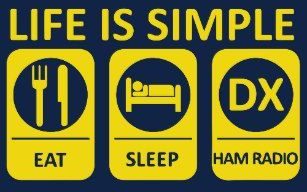DATE: Saturday 2-APRIL-2022
TIME: 11.00 am
DURATION: 45-90 MIN
FREQUENCY:
Net begins on
- PRIMARY – 145.29(-) PL110.9
- SECONDARY – DMR TG-311037
LOGGING: NetLogger for station and assigned alternate NCS
TRAINING VIDEO:
Click to View
REQUEST FOR INFORMARION (RI)
Net Control or any relay station will be requesting checked in stations to provide on a volunteer basis any of the following:
- ANY COUNTY FIPS
- ODOMETER READING
FIPS EXAMPLE: 12099
FLORIDA: 12
PALM BEACH COUNTY: 099
CLICK TO FIND FIPS BY STATE / COUNTY
To find your city of birth, access Google and enter the city name and state
EXAMPLE: “Zip code for Portland Maine USA”
VHF SIMPLEX:
Analog – 146.55
SSB – 144.200 (FOCUS AREA)
DMR 145.510 CC-1 TS1- TG-99 (FOCUS AREA)
UHF SIMPLEX:
Analog – 446.000
DMR – 441.000 CC-1 TS1- TG-99 (FOCUS AREA)
HF SIMPLEX:
- 80m – 3.820 mHz LSB [FOCUS]
- 10m – 28.420 mHz USB [FOCUS]
- 6m – 50.125 mHz USB [FOCUS]
NOTE – frequencies may change based on usage
Types of Information Requested – Request for Information (RI)
- Road Conditions
- Local news
- Internet availability
- Water availability
- Power availability
- Hotel availability
- Airport Weather
- Fuel availability
- Telephone availability
- Station status
- WWV frequency and status
Please note – Analog voice will be our primary mode of communication. We will add more focus on HF. Before this net, stations should prep for their station setup.
GOAL:
- Station check into 145.29 at net start time
- Stations operate on assigned simplex frequencies
- Stations be ready to RELAY messages and stations
- Stations be ready to assume Net Control duty
- Stations begin using pro-words and other practices for simplex nets
- Make request for information (RI) and respond to request (RRI)
PREPERATION:
- Monday 7pm Voice Com Net on 145.29
- Daily 6pm NTS Nets on 146.61
NET CONTROL STATION SCTIPT: CLICK for the script
Before the net is established, stations are encouraged to:
1. Fully test radios
2. Setup the 2 simplex frequencies on their radios
3. Become familiar with programming their radios
4. Know how to use reverse when on the repeater
5. Know how to turn on and off squelch
6. Have set up best power and antennas options
7. Have identified a location for optimal performance
8. Station be ready to relay other stations
The Simplex Exercise will be established on 145.29 mHz and stations will check in.
Once NCS has checked in all stations, the following will occur:
1. NCS will assign an alternate NCS (ANCS)
2. NCS will direct stations to QSY to simplex frequency
3. NCS will make a call for stations on simplex frequency
4. Each station will provide callsign and signal report
5. NCS will record each station’s signal report
6. NCS will direct station to QSY to 145.29 mHz
7. NCS will report findings on the 145.29 mHz Net
8. NCS will ask for comments and then close the net
Stations may desire to remain on the repeater after the net closes to troubleshoot any problem that arise.
Because these exercises test our abilities and capabilities on simplex frequencies, we need to rely on clear communications. Using prowords and signal reports helps remove any use of coded communications such as 10-4 or “copy that”. Please note the use of the proword and when they are used by examples.
READABILITY AND SIGNAL STRNGTH
PRO-WORDS
For these exercises, stations should become familiar with use of this list of pro-words.
AFFIRMATIVE – station response to YES or NO question
CORRECTION – error made, continue with last word correctly transmitted
FIGURE (S) – Numerals or numbers follow
I SAY AGAIN – station repeating transmission or portion indicated
NEGATIVE – station response to YES or NO question
OUT – end transmission, no answer is required or expected
OVER – end transmission, response is necessary, go ahead transmit
RELAY (TO) – transmit message to all addressees
ROGER – station acknowledgment of message copied
SPEAK SLOWER – transmission is too fast, reduce speed
WAIT – pause for a few seconds
Examples of use
BB1AA THIS IS AA1BB NEGATIVE OVER
BB11AA THIS IS AA1BB ROGER OUT
THIS IS AA11BB SAY AGAIN CALLSIGN OVER
BB1AA THIS IS AA1BB ASSUME ALTERNATE CONTROL OUT
THIS IS BB11AA FOR NET CONTROL ADDITIONAL STATIONS OVER
BB1AA THIS IS AA1BB RADIO CHECK OVER
AA1BB THIS IS BB11AA WEAK WEAK READABLE OUT
“THIS IS” may be omitted by stations for brevity.
DO’S AND DONT’S
WHEN CHECKING IN, SAY YOUR CALLSIGN SLOWLY EG: “AA1BB OVER”
WHEN CHECKING IN, NO NEED TO SAY “THIS IS”
WHEN CHECKING IN, PLEASE PAUSE BEFORE TRANSMITTING
PRACTICE AND USE PRO-WORDS
ADVOID SAYING YOUR NAME, BREVITY IS BEST
SLOWDOWN, KEEP COOL, PAUSE AS NEEDED
CAPAPILITIES TO EXERCISE
Capabilities for this exercise follows:
- ID stations capable of DMR, SSB, FLDigi and SlowScan
- Station use FLDigi and SlowScan as assigned by NCS
- Use approved pro-words
- Pass station messages eg brief news item
- Assign stations as Alternate NCS
- Alternate NCS report checked in stations
Capabilities to test for next exercise follows:
- Test HF and integrate component
- Signal reports and QTH all stations
- Passing health and welfare
- Pass digital traffic
- Pass slow-scan pictures
What we choose to exercise will be by consensus and as suggested by participants.

